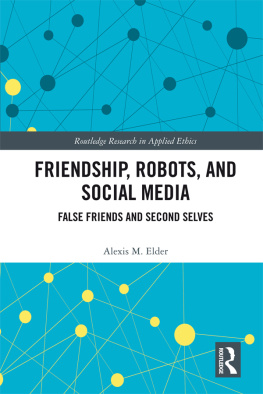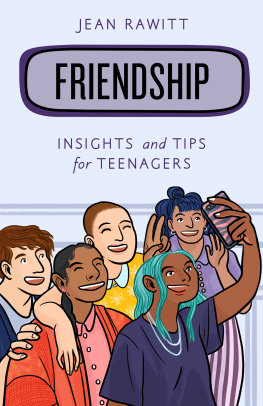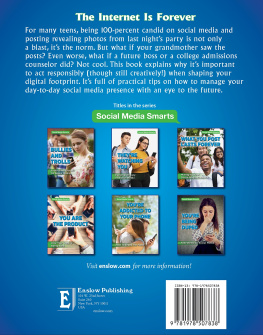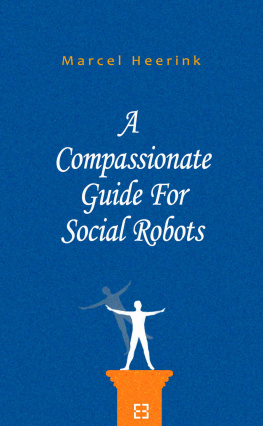Alexis M. Elder - Friendship, Robots, and Social Media: False Friends and Second Selves
Here you can read online Alexis M. Elder - Friendship, Robots, and Social Media: False Friends and Second Selves full text of the book (entire story) in english for free. Download pdf and epub, get meaning, cover and reviews about this ebook. year: 2017, publisher: Taylor & Francis (CAM), genre: Children. Description of the work, (preface) as well as reviews are available. Best literature library LitArk.com created for fans of good reading and offers a wide selection of genres:
Romance novel
Science fiction
Adventure
Detective
Science
History
Home and family
Prose
Art
Politics
Computer
Non-fiction
Religion
Business
Children
Humor
Choose a favorite category and find really read worthwhile books. Enjoy immersion in the world of imagination, feel the emotions of the characters or learn something new for yourself, make an fascinating discovery.
- Book:Friendship, Robots, and Social Media: False Friends and Second Selves
- Author:
- Publisher:Taylor & Francis (CAM)
- Genre:
- Year:2017
- Rating:5 / 5
- Favourites:Add to favourites
- Your mark:
- 100
- 1
- 2
- 3
- 4
- 5
Friendship, Robots, and Social Media: False Friends and Second Selves: summary, description and annotation
We offer to read an annotation, description, summary or preface (depends on what the author of the book "Friendship, Robots, and Social Media: False Friends and Second Selves" wrote himself). If you haven't found the necessary information about the book — write in the comments, we will try to find it.
Alexis M. Elder: author's other books
Who wrote Friendship, Robots, and Social Media: False Friends and Second Selves? Find out the surname, the name of the author of the book and a list of all author's works by series.
Friendship, Robots, and Social Media: False Friends and Second Selves — read online for free the complete book (whole text) full work
Below is the text of the book, divided by pages. System saving the place of the last page read, allows you to conveniently read the book "Friendship, Robots, and Social Media: False Friends and Second Selves" online for free, without having to search again every time where you left off. Put a bookmark, and you can go to the page where you finished reading at any time.
Font size:
Interval:
Bookmark:

Various emerging technologies, from social robotics to social media, appeal to our desire for social interactions, while avoiding some of the risks and costs of face-to-face human interaction. But can they offer us real friendship? In this book, Alexis Elder outlines a theory of friendship drawing on Aristotle and contemporary work on social ontology, and then uses it to evaluate the real value of social robotics and emerging social technologies.
In she shifts her focus to connections between real people, especially those enabled by social media. Arguing against critics who have charged that these new communication technologies are weakening our social connections, Elder explores ways in which text messaging, videochats, Facebook, and Snapchat are enabling us to develop, sustain, and enrich our friendship in new and meaningful ways.
Alexis M. Elder is an assistant professor of philosophy at the University of Minnesota Duluth. Her research focuses on friendship and social technologies. Her publications include Excellent Online Friendships: An Aristotelian Defense of Social Media in Ethics and Information Technology, and Zhuangzi on Friendship and Death in Southern Journal of Philosophy.
1Vulnerability, Autonomy and Applied Ethics
Edited by Christine Straehle
2Refugees and the Ethics of Forced Displacement
Serena Parekh
3Procreation, Parenthood, and Education Rights
Ethical and Philosophical Issues
Edited by Jaime Ahlberg and Michael Chobli
4The Ethics of Climate Engineering
Solar Radiation Management and Non-Ideal Justice
Toby Svoboda
5Corporal Punishment
A Philosophical Assessment
Patrick Lenta
6Hobbesian Applied Ethics and Public Policy
Edited by Shane D. Courtland
7Does the Pro-Life Worldview Make Sense?
Abortion, Hell, and Violence Against Abortion Doctors
Stephen Kershnar
8The Injustice of Punishment
Bruce N. Waller
9Friendship, Robots, and Social Media
False Friends and Second Selves
Alexis M. Elder

First published 2018
by Routledge
711 Third Avenue, New York, NY 10017
and by Routledge
2 Park Square, Milton Park, Abingdon, Oxon OX14 4RN
Routledge is an imprint of the Taylor & Francis Group, an informa business
2018 Taylor & Francis
The right of Alexis M. Elder to be identified as author of this work has been asserted by her in accordance with sections 77 and 78 of the Copyright, Designs and Patents Act 1988.
All rights reserved. No part of this book may be reprinted or reproduced or utilised in any form or by any electronic, mechanical, or other means, now known or hereafter invented, including photocopying and recording, or in any information storage or retrieval system, without permission in writing from the publishers.
Trademark notice: Product or corporate names may be trademarks or registered trademarks, and are used only for identification and explanation without intent to infringe.
Library of Congress Cataloging-in-Publication Data
Names: Elder, Alexis M., author.
Title: Friendship, robots, and social media : false friends and second selves / Alexis M. Elder.
Description: 1 [edition]. | New York : Routledge, 2018. | Series: Routledge research in applied ethics ; 9 | Includes bibliographical references and index.
Identifiers: LCCN 2017051253 | ISBN 9781138065666 (hardback : alk. paper)
Subjects: LCSH: Social interaction. | Friendship. | Robots. | Social media.
Classification: LCC HM1111 .E525 2018 | DDC 302dc23
LC record available at https://lccn.loc.gov/2017051253
ISBN: 978-1-138-06566-6 (hbk)
ISBN: 978-1-315-15957-7 (ebk)
Typeset in Sabon
by Apex CoVantage, LLC
Part I
Friendship
Part II
Robots
Part III
Social Media
I am deeply indebted to a great many generous individuals who have supported me throughout this project, more than I could possibly list here. But I will try to name at least a few.
Richard Volkman, who has been encouraging me since my undergraduate days to explore philosophy, Aristotle, ethics of friendship, and ethics of technology. Terrell Ward Bynum for introducing me to computer ethics. Fran Grodzinsky, for giving me the idea for at least one chapter and offering sage advice and supportive feedback at many critical junctures. Heidi Lockwood, for urging me to turn a chance comment in a Q&A into a paper that then grew into a research project in social robotics. Marty Wolf for his mentorship in computer ethics. The ETHICOMP research community for many wonderful and inspiring conferences. IACAP and SPT conference-goers likewise.
The Philosophy and Womens Studies departments at Southern Connecticut State University proved to be grounds for many rich and rewarding conversations that contributed to the development of the ideas in this book: I am indebted to Xiaomei Yang, Armen Marsoobian, Eric Cavallero, Ken Gatzke, Rex Gilliland, Krystyna Gorniak, Chelsea Harry, David Pettigrew, Sarah Roe, and Yi-Chun Tricia Lin, in addition to those already mentioned. Sheila Magnotti, the SCSU Philosophy Departments amazing secretary, is not only phenomenally helpful but also my Snapchat buddy.
Many thanks to Mark Lowe and the Quinebaug Valley Community College community, who had me out to give several talks that turned into wonderful conversations with faculty, administrators, and students alike on the values and risks of social technologies. My fabulous colleagues at the University of Minnesota Duluth have helped me to develop this research in new and unexpected directions, including much helpful guidance on the literature in cognitive science and behavioral economics, as well as social media, robotics, ethics, and yet more Aristotle: Jeanine and Bob Schroer, Jason Ford, Sean Walsh, and Eve Rabinoff, not to mention two terrifically helpful administrative specialists, Bridget Park and Terry Estep. Shannon Vallor, John Sullins, and the audience at the 2016 Pacific APA contributed to a stimulating conversation about social robotics.
I am indebted to the students in my classes at the University of Connecticut, Southern Connecticut State University, Quinnipiac University, and the University of Minnesota Duluth, with whom I enjoyed too many terrific discussions to list here and who greatly enriched my thinking about these complex issues. You all are the best students a teacher could ask for. I am also thankful for my colleagues and classmates at the University of Connecticut, with whom I shared many stimulating conversations about the nature of friendship, especially Paul Bloomfield.
And last but certainly not least, Thomas Dorr, steadfast cheerleader, supplier of tamales while research and writing kept me out of the kitchen, extraordinarily conscientious unpaid research assistant and reference management support, and friend.
An earlier version of was published in Ratio (2014) Volume 27 (1), pp. 8499 under the title Why Bad People Cant Be Good Friends. It appears here with permission of John Wiley and Sons.
Portions of were published in Ethics and Information Technology (2014) Volume 16 (4), pp. 28797 under the title Excellent Online Friendships: An Aristotelian Defense of Social Media. It appears here with permission of Springer.
Font size:
Interval:
Bookmark:
Similar books «Friendship, Robots, and Social Media: False Friends and Second Selves»
Look at similar books to Friendship, Robots, and Social Media: False Friends and Second Selves. We have selected literature similar in name and meaning in the hope of providing readers with more options to find new, interesting, not yet read works.
Discussion, reviews of the book Friendship, Robots, and Social Media: False Friends and Second Selves and just readers' own opinions. Leave your comments, write what you think about the work, its meaning or the main characters. Specify what exactly you liked and what you didn't like, and why you think so.










